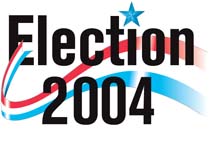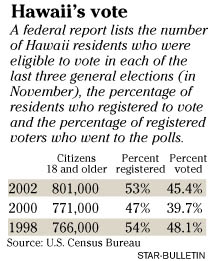

|
Officials worry eligible
voters will stay home
Democrats are giving away T-shirts and CDs, Republicans are calling people on six years' worth of voter lists and Gov. Linda Lingle marched her Cabinet down to City Hall to vote absentee.
 No election-year stunt is left undone in the last weeks of this primary election season.
No election-year stunt is left undone in the last weeks of this primary election season.
Still, election officials fear eligible Hawaii voters will stay home next Saturday and just not vote.
Dwayne Yoshina, state elections chief, says the vote turnout could slip to 40 percent of registered voters or less.
"Let's hope for the same turnout as two years ago. Now there doesn't seem to be much interest," Yoshina said.
In 2000, Hawaii had the nation's lowest percentage of eligible voters go to the polls -- 39.7 percent.
Although the election on Saturday is a primary in which each political party votes for its nominees for the general election, one or more key Honolulu races will be decided.
Yoshina says he fears that because it is a primary, voters will not realize that they will be picking the Honolulu prosecutor and perhaps the mayor of Honolulu.
Because those two races, along with the City Council contests, are nonpartisan, if any candidate gets more than 50 percent of the votes cast in that race, the candidate is elected.
So because there are just two candidates for city prosecutor, Peter Carlisle and Keith Kaneshiro, one will get more than 50 percent and be elected on Saturday.
In order to spur voters, Lingle took her Cabinet across Punchbowl Street to City Hall last week to vote absentee.
"We are doing this to highlight voting absentee and also to draw attention to voting," Lingle said.
She fears that voters will forget that Saturday is primary election day.
"Saturday is a day people spend with family, it is the day they have soccer games and catch up on errands, so it is very easy to forget or to just say, 'It is just a primary election,'" Lingle said.
 Figures collected by the federal Census Bureau bear out Lingle's fears. A survey done by the bureau shows that in 2002, 27 percent of the nation's registered voters who did not vote said they did not go to the polls because they were either too busy or had conflicting work or school schedules.
Figures collected by the federal Census Bureau bear out Lingle's fears. A survey done by the bureau shows that in 2002, 27 percent of the nation's registered voters who did not vote said they did not go to the polls because they were either too busy or had conflicting work or school schedules.
Men, younger adults (18-44) and those with higher education were more likely to say they were too busy to vote, according to the federal report.
One way to get people to vote is to mail them an absentee ballot. Political organizations, labor unions and candidates are helping potential voters request a mail-in absentee ballot, and then follow up with campaigns to get them to vote.
In Oregon, where 56 percent of the registered voters vote, all the elections are by mailed-out ballots.
"Since the 2000 presidential election, the citizen voting rate in Oregon has been higher than in most other states," the federal census report noted.
Six states -- Idaho, Maine, Minnesota, New Hampshire, Wisconsin and Wyoming -- allow citizens to register to vote on election day, and they have higher-than-average voter turnout, according to the report.
North Dakota has no voter registration -- anyone can vote -- and about 55 percent of the population did so in the last election.
Ray Wolfinger, a political scientist at University of California- Berkeley who has written several books on voter turnout, said the people who are more likely to vote are more educated, older and remain at the same address for a longer period of time.
"Because one-third of population moves every year, this means there is a constant crop of voters that need to be reregistered," Wolfinger said.
After you get people registered, getting them to the polls is another problem. Wolfinger says his studies show that extending polling hours, allowing voters to vote later in the day and giving them more information is the best way to raise participation.
In California all voters are mailed a sample ballot, which Wolfinger says has helped raised participation rates by two or more percentage points.
Keeping the polls open to 8 p.m. has also helped, he added.
"These things make a difference to the less educated and to younger people," Wolfinger said.
Neither idea has been considered by Hawaii lawmakers, although state law requires that constitutional amendments be printed in a daily newspaper, and the state election's office offers candidates space on its Internet site to put information about their campaign.
The final decision of whether to participate, however, will be made by the voter.
"The only way to be certain you don't make a difference is to stay. Your only opportunity to have a positive impact is to go vote," Lingle said.
www.hawaii.gov/elections
Democratic Party of Hawaii
www.hawaiidemocrats.org
Republican Party of Hawaii
www.gophawaii.com